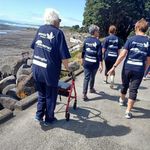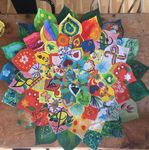Addressing the needs of Chinese with dementia: A cross-community organisation and academic approach - eCALD
←
→
Page content transcription
If your browser does not render page correctly, please read the page content below
2021
eCALD® Cross-Cultural Interest Group (CCIG)
In-person and Zoom Presentation
Addressing the needs of Chinese with
dementia: A cross-community
organisation and academic approach
Rhonda Preston-Jones (Dementia Auckland)
Ray Law (Age Concern Auckland)
Gary Cheung (University of Auckland)
Date: 16th March 2021 (Tuesday) 6.30pm to 8.30pm)Agenda
• Journey through Dementia
• Introducing Dementia Auckland
• Introducing Age Concern Auckland
• University of Auckland research
• Age Concern Auckland’s Chinese carer focus group
• What we are doing together – the proposal for
improving services for Chinese people living with
dementiaDementia Auckland
Service from Waiuku to Wellsford
The team
CEO
Clinical Lead
3 Marketing & Fundraising Team
1.5 Educators
8 Keyworkers
3.5 Living Well Team
Accountant
Administration
Four offices – Grey Lynn, Pakuranga, Henderson and OrewaDementia Auckland
Purpose, beliefs and values
Making life better for
all people affected by dementia
Kia piki te ora mo nga tangata mate porewarewaDementia Auckland
Purpose, beliefs and values
Purpose Values
Kindness
We enable all people affected by dementia to live their best life
Empathy
Beliefs
Respect
• We see the person, not the condition – I am still me
• We use clinical expertise to empower people, side by side through their journey
Community
• We help navigate the new normal
• We support and respect diversity Acceptance
• We have the courage to ask for resources
• We do this with kindness ProfessionalismDementia Auckland
Service Team Structure
Keyworkers
8 - Funded by the DHBs
Living Well Team
3.5 - Unfunded
Educators
1.5 – Under funded by the DHBsDementia Auckland
Keyworkers
Nicola Brenton (SW)-West
Brenda Kearns (EN)-North Shore
Jo Temple (RN)– Rodney
Jemma Heap (RN)–West
Bronwen McGregor (RN)– East
Nicola Fletcher Williams (RN)- East
Lesley Sowden (RN)- Central
Julie Kerr (OT)- SouthDementia Auckland
Keyworker Support Service - For care partners and families
1:1 support, information, resources and
advice
Face to face, email, phone
Navigation through the health system
Support Groups
Young Ones Support GroupDementia Auckland
Living Well Team
Team Leader:
Sarah K at Grey Lynn office
Group Facilitators:
Kelly in South Auckland
Terry in Central Auckland
Lynn in West Auckland
Sarah D on the North Shore
Sarah K on mCST & CST
Gill (Pukekohe on Contract)Dementia Auckland
The Dementia Journey
Dementia is a slowly deteriorating neurological condition. The Living Well Team aims to provide a bridge between people’s normal everyday activities
and social contacts and the programmes / services funded by the Ministry of Health for people with more severe dementia.
MCI Mild Dementia Mild/Moderate Moderate Moderate/Severe Severe Dementia
Involved in `normal everyday Dementia Day
Suitable for Living Well Groups
activities and socialising’ Programmes or in careDementia Auckland
Living Well Services
The Aim of the groups is to provide:
Opportunities for socialising for people with dementia & their carers
Stimulating, normal, meaningful activities for adults.
Graded and modify activities to facilitate participation for people with
dementia at whatever level they can within the group activity
Activities focused on well preserved old skills rather than requiring
new learning
A non-judgemental environment where people with dementia can
participate and socialise thus experiencing mastery, success,
pleasure and fun
Carers a predictable opportunity to have a break or respite from the
person they are supporting for a few hoursDementia Auckland
Living Well Groups - For people living with dementia
Cognitive Stimulation Therapy Dancing Group
Maintenance CST Book Club
Walking Groups Petanque Group
Singing Group Creative Eco Group
Exercise Groups Men’s Gym Group
Art Groups Young Onset GroupDementia Auckland
Educators
Maria Co – Fulltime
Rhonda, Winifred – part time
Carer Education Programs
Masterclasses
Dementia Talks
Community Education
Professional Education
Brain Health Coaching (Sally)Dementia Auckland
Marketing and Fundraising Team
Public awareness and anti stigma campaigns
Mind Matters Newsletter
Social media – Website, Facebook
Media releases, television appearances
Fundraising eventsRay LAW
Asian Services Manager
Registered social worker / counsellor• The vision of Age Concern Auckland is for older people to live
a valued life in an inclusive society.
• We are committed to promoting wellbeing, rights, respect and
dignity for older people.Each year our services directly help 18,000
older people & provide information & advice
to 40,000Our 3 offices in Auckland: 57 Rosebank Road, Avondale (Central and West) 250 Puhinui Road, Papatoetoe (Counties Manukau) 177B Shakespeare Road, Milford (North Shore) • 45 paid staffs (full time and part time) • Around 550 volunteers
Our Structure
Services deliver in Age Concern Auckland
• Information about local communities group
• Field Work Service
• Elder Abuse and Neglect Prevention Service
• Social Connect Services
• Health Promotion
• Total Mobility Scheme
• Asian Services
Our services and support cover all parts of AucklandAsian team’s support toward
people affected by dementia
• Individual and family case work
• Arrange volunteers visit
• Deliver health talks on EPoA, ACP and Will
• Talks on brain health and early signs of dementia
• Deliver activities in rest home to stimulate resident’s cognition
responsesServices for Asians Whose Lives Are
Affected by Dementia
Who are we talking about?
Where do they live?
Health Services - Who is doing what, where ?Who – Auckland Population
Auckland is a culturally diverse community
Maori 23.9%
Pacifica 16 %
Asian and South East Asian 28.2 %
Indian subcontinent 10 %
Middle Eastern 2.3 %Who comes under the category of “Asian”
New Zealand born and raised Asians
New arrivals from:
Mainland China Lao
Hong Kong Thailand
Taiwan Malaysia
Vietnam Singapore
Cambodia Indonesia
BurmeseAre Asians an homogenous group? No! Of course not! Different countries of origin, different, cultures, languages, religions Chinese families 4th or 5th generation New Zealanders New immigrants Large families Very small families People living alone
Where does the Asian population live in Auckland?
All over Auckland with
some concentrated
pockets in East Auckland
and on the North ShoreWhat issues do Asian families living with dementia face?
What issues do Asian families living with dementia face?
University of Auckland Research Dr Gary Cheung (Old Age Psychiatrist)
The LiDiA study
(Living with Dementia in Aotearoa)
Sarah Cullum (PI)
Makarena Dudley (Māori)
Fiva Fa’alau (Samoan)
Etuini Ma’u (Tongan)
Tony Kautoke (Tongan Co-Lead)
Rita Krishnamurthi (Indian)
Gary Cheung (Chinese)
Adrian Martinez-Ruiz
Susan Yates
Ngaire KerseStudy 1: Engaging Asians in dementia care
and research: The clinicians’ perspectives
Stage 1: 4 focus groups in a research workshop; video-taped
• 30 HCPs who have experience and/or an interest in working with Asian
people on dementia care
• Nursing (23%), social work (20%), medical (10%) and occupational therapy
(10%)
• 63% Chinese, 20% European, 10% Korean, 7% IndianStage 1
Study 1: Engaging Asians in dementia care
and research: The clinicians’ perspectives
Stage 2: Selected participants from Stage 1; audio-taped
• 11 HCPs
• Nursing (36%), community support worker (18%), social work (18%), and
occupational therapy (18%)
• 82% Chinese, 9% Korean; 9% IndianStage 2: 4 main themes
Theme 1: Cultural interpretations of dementia
Theme 2: Stigma
Theme 3: Filial piety and collectivism
Theme 4: Inequality in availability of resources
- Disparities in available information
- Disparities in services
- Opportunities for educationStudy 2: The understanding and
experiences of living with dementia in
Chinese New Zealanders
Other authors: April Su, Karen Wu, Blake Yue, Susan Yates, Adrian Martinez-Ruiz,
Rita Krishnamurthi, Sarah Cullum
16 study participants:
- 5 dyads of a person with mild dementia and a care
partner (husband: n=1; wife: n=1; son: n=2)
- 1 person with mild dementia
- f5 care partners of people with more severe dementia
(wife: n=2; daughter: n=2; son: n=1)Study 2: 5 main themes
• Theme 1: Understanding of dementia
• Theme 2: Impact on the person living with dementia
• Theme 3: Impact on family carers
• Theme 4: Stigma
• Theme 5: Experience with health care and support services: cultural expectation,
language barrier and the importance of professionalism
- Positive remarks on NZ services
“Overall, I am blessed and very happy with everything here in NZ.”
- The emotional support from clinicians has been very valuable for family members
“Health care professionals should be compassionate and have “heart” when
caring for people living with dementia.”Feedback from Chinese carer support focus groups To have more information on care and support, having channel to ask and receive information in Chinese. To have support group to ventilate the carer’s stress – smoothing group Lack of understanding of dementia among the Chinese community – education on Dementia Lack of understanding about medication and it’s side effect. Client would concern and worries when GP mentioned about the negative side effect. To learn more ways/skills to communicate and interact with client. Learn to self care and self-adjustment. The dementia service and support can be developed more. Can be able to form a stronger unify support group. From the findings and discussion, most agreed that 1) increase awareness about dementia is the most important, then is 4) carer’s support.
What issues do Asian families living with dementia face? Language Cultural Different health beliefs Stigma Isolation Lack of support Cost Low health literacy
What does the New Zealand Health System offer Asian Families?
DHBs – assumption that one size fits all
Culturally inappropriate support services eg: NASC services
Random allocation of bilingual/bicultural Asian staff
Interpreters
Private practicing bilingual/bicultural Asian – GPs, Physios, Chinese
medicine practitionersWhy do we need to do something different?
Unique issues of:
• Lack of awareness and understanding
• Stigma
• Misunderstanding and distress
• Isolation
• Health needs not addressed
• Carer stress
• Families caring in challenging situations with the minimum of
knowledge, information, support, services and recoursesWhy do we need to do something different? Unique issues of: Lack of awareness and understanding Stigma Misunderstanding and distress Isolation Health needs not addressed Carer stress Families caring in challenging situations with the minimum of knowledge, information, support, services and recourses
Why is this journey through dementia map wrong for many Asian families?
The journey through dementia
Knowing Recognising Doing Getting some Getting Gaining Making the Managing the Managing the
about the signs something support to support to information best of the challenging end
Dementia about it in a navigate the cope good years years
timely system
manner
Services required:
Public Pre-diagnostic Assessment 1:1 Support, Carer/Family Carer/Family Living Well Managing Managing end
awareness of advice and and diagnosis advice and Support Education groups/ challenging stage
dementia and support of dementia, navigation Groups programmes activities for behaviours dementia at
anti-stigma planning for through the people living and the severe home
campaigns the future journey of with a dementia,
dementia diagnosis of
dementia
(PLWD)
Provided by Dementia Auckland Provided by the DHB’sThe journey through dementia
Knowing Recognising Doing Getting some Getting Gaining Making the Managing the Managing the
about the signs something support to support to information best of the challenging end
Dementia about it in a navigate the cope good years years
timely system
manner
Who provides Culturally appropriate Services for Asian families ?
Public Pre-diagnostic Assessment 1:1 Support, Carer/Family Carer/Family Living Well Managing Managing end
awareness of advice and and diagnosis advice and Support Education groups/ challenging stage
dementia and support of dementia, navigation Groups programmes activities for behaviours dementia at
anti-stigma planning for through the people living and the severe home
campaigns the future journey of with a dementia,
dementia diagnosis of
dementia
(PLWD)
No one Done well by the DHB’s Done poorly by Dementia Auckland Done poorly by the DHB’sJOINT PROPOSAL
To develop better Chinese
Services for people whose
lives are affected by DementiaThe proposed plan
Establish priorities ‐ Increasing Awareness in the Asian community
‐ Education and Support for Carers/families
Work Age Concern Auckland, Dementia Auckland, local cultural communities and the local
collaboratively DHB and PHO’s will need to work together to develop and fund these services.
Design a Service ‐ The service to be staffed by Asian health professionals, with a background in working
in dementia services, skilled to work as Key Workers and Educators.
‐ A minimum of two staff
‐ Staff, resources, education and support services would need to be able to tri‐lingual
( Cantonese, Mandarin and English).
‐ Expand to other cultural communities
‐ Increase services by recruiting volunteers from each community to support people
living with dementia and their families.The steps involved in developing a new service
What Progress
1) Research the needs within the community Done
2) Consult with stakeholders Health Professional Consultation
meeting planned for late March
3) Develop and plan StartedWhat How
4) Seek funding The funding would need to come from a DHB allocation, grant
applications to community trust and fundraising within the Asian
community.
5) Engage researchers to study
the process
6) Launch a trial project It is recommended that this project start with a small
manageable trial in a specific area such as the Chinese
community in the Howick/Botany/Pakuranga area, thus involving
the CMDHB.
7) Write the trial up and report
back to stakeholders
8) If successful expand and embed
the service into a wider
populationDementia Auckland
Thank youYou can also read



























































